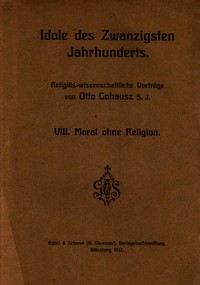Idole des Zwanzigsten Jahrhunderts. VIII. Moral ohne Religion by Otto Cohausz
"Idole des Zwanzigsten Jahrhunderts. VIII. Moral ohne Religion" by Otto Cohausz is a philosophical and theological treatise written in the early 20th century. The book discusses the concept of morality in a modern context, where religious values are increasingly rejected. Cohausz argues that without a divine basis for moral principles, society is left in confusion regarding ethical standards. In this work, Cohausz contends that moral values traditionally stem from religious teachings, specifically
those of Christianity, and without this foundation, there is a chaotic array of conflicting moral philosophies. He critiques various modern ethical frameworks, emphasizing the need for an absolute norm of morality, which he argues can only be provided by God. The text ultimately defends the necessity of a theistic moral framework to guide human behavior, suggesting that true morality cannot exist independently of religious belief. Through his arguments, Cohausz warns of the consequences of separating morality from its divine origin, painting a picture of societal decay without a shared moral foundation. (This is an automatically generated summary.)
Read now or download (free!)
| Choose how to read this book | Url | Size | ||||
|---|---|---|---|---|---|---|
| Read online (web) | https://sendtokindle.compellingsciencefiction.com/ebooks/63743.html.images | 88 kB | ||||
| EPUB3 (E-readers incl. Send-to-Kindle) | https://sendtokindle.compellingsciencefiction.com/ebooks/63743.epub3.images | 164 kB |
Send
to kindle email: |
|||
| EPUB (older E-readers) | https://sendtokindle.compellingsciencefiction.com/ebooks/63743.epub.images | 162 kB | ||||
| EPUB (no images, older E-readers) | https://sendtokindle.compellingsciencefiction.com/ebooks/63743.epub.noimages | 81 kB | ||||
| Kindle | https://sendtokindle.compellingsciencefiction.com/ebooks/63743.kf8.images | 196 kB | ||||
| older Kindles | https://sendtokindle.compellingsciencefiction.com/ebooks/63743.kindle.images | 182 kB | ||||
| Plain Text UTF-8 | https://sendtokindle.compellingsciencefiction.com/ebooks/63743.txt.utf-8 | 75 kB | ||||
| Download HTML (zip) | https://www.gutenberg.org/cache/epub/63743/pg63743-h.zip | 185 kB | ||||
| There may be more files related to this item. | ||||||
About this eBook
| Author | Cohausz, Otto, 1872-1938 |
|---|---|
| Title |
Idole des Zwanzigsten Jahrhunderts. VIII. Moral ohne Religion
Religiös-wissenschaftliche Vorträge |
| Note | Reading ease score: 69.2 (8th & 9th grade). Neither easy nor difficult to read. |
| Credits |
Produced by The Online Distributed Proofreading Team at
https: //www.pgdp.net |
| Language | German |
| LoC Class | BR: Philosophy, Psychology, Religion: Christianity |
| Subject | Christianity -- 20th century |
| Category | Text |
| EBook-No. | 63743 |
| Release Date | Nov 13, 2020 |
| Copyright Status | Public domain in the USA. |
| Downloads | 110 downloads in the last 30 days. |
| Project Gutenberg eBooks are always free! | |

